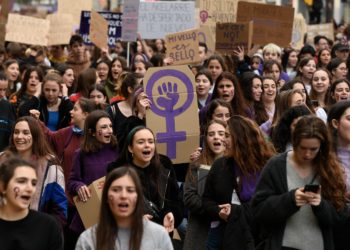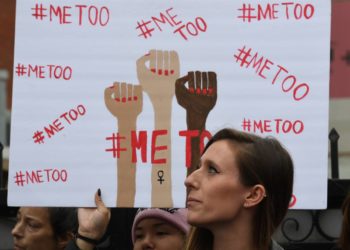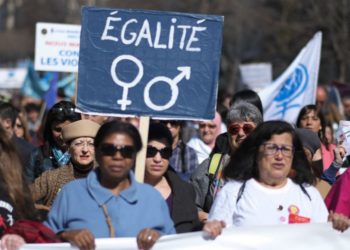Over 55 percent of the world’s population currently lives in cities, and this proportion is expected to increase to about 70 percent by 2050. The percentage of women living in cities has also been rising steadily, and women are over-represented in city slums, especially in South Asia and Latin America.
Gender, Urban Violence, and Urban Injustice
So there we are, billions of us, walking our cities’ streets. And, as any female reader would know only too well, we often walk them in fear. Fear to be alone at the bus stop at night, to be harassed in a poorly lit alley, to be physically or sexually attacked.
I am based in London, and the tragic death of Sarah Everard, a fellow Londoner abducted and murdered as she walked home one evening in March, is still awfully fresh in my memory.
But there is more to urban injustice than street harassment and gender-based violence. Cities are also the administrative entities responsible for organizing the services we all rely on, such as healthcare, education, welfare, and public transports. And these services are often unequally implemented based on users’ race, class, and crucially, gender.
What categories of urban residents are, indeed, especially under-served? If I ask myself this question, a few images immediately come to mind.
I think of a working woman living in a poorly connected district, unable to afford a taxi. Or of a single mother forced to take her two kids to different and faraway schools or to push a pram down an underground station’s stairs. I picture an elderly, pregnant, or disabled woman needing constant medical attention from an overcrowded hospital and wearing a mask to protect herself from polluted urban air. And I visualize the many LBT and migrant girls living by themselves in isolated suburbs or even sleeping rough in subway halls.
Cities Built for Men?
Female vulnerability, however, is not necessarily the most useful perspective through which to analyze the problem. It is not women that are especially vulnerable in urban contexts. It is our cities that have been historically designed and built for men, and for white, privileged ones specifically.
Still today, key decisions regarding cities’ administration are made with a hypothetical, gender-neutral resident in mind. Yet this supposed gender-neutrality erases the fact that most cities fail to meet women’s specific needs and rights.
I use the word “right” consciously here. The idea that people might have an actual “right” to the city has gained increasing momentum among social movements and NGOs globally over the last few years. It is connected to the notion of the city as a “common” — a collective resource that everyone is entitled to enjoy.
But, rather evidently, women’s right to their cities has long been denied, and the COVID-19 pandemic has only aggravated this state of affairs. Female essential workers such as nurses had to put up with even more infrequent transport fares at the end of their extra shifts. Mothers with kids to home-school and no access to public parks experienced particularly hard lockdowns.

Yet if cities remain, today more than ever, biased and unfair spaces, they also hold tremendous potential for women and progressive social change. It is in cities that most great civil and social rights revolutions have begun. It is in cities that women – and people – are most free to experiment with different gender identities, and to participate in cultural and economic life and in political struggles. And so, it is from these contradictory, conflict-ridden but undeniably creative hubs that new, inclusive, and feminist-friendly policies and practices can be developed.
Towards Fairer Cities
Policymakers globally are faced with the task of designing sustainable and safe ways to inhabit cities during the ongoing coronavirus emergency. Leveraging medium-size cities’ potential for socio-economic development has been identified as one of the top priorities of this year’s G20. In other words, it feels like a good moment to vigorously incorporate concerns related to both gender and inequality in urban planning and urban governance.
As often happens, there is no need to reinvent the wheel. Generations of feminist activists and urban experts have devised effective gender mainstreaming guidelines — sets of questions, tools, and principles for decision makers and stakeholders at all levels to integrate into their work.
There are plenty of cases in which such approaches have been successfully implemented. In Vienna, for instance, entire social housing districts have been built adopting women’s everyday needs as a design criterion. In several French cities, gender budgeting is used as a governance tool, and Barcelona’s city council now has a specialized gender mainstreaming department.
Of course, racial, ecological, and social justice issues should be “mainstreamed” alongside gender ones. And this is because a truly feminist city is not just a more welcoming city for women. It is a resilient, sustainable, inclusive city where everyone is allowed to live with dignity, and a space towards which we all share not only a collective right, but a collective duty of care.
In a post-COVID scenario, we can’t go back to urban politics as usual. Instead, we must be brave and visionary enough to envisage income, housing, welfare, and transport policies enabling people of any gender not only to inhabit and enjoy the city, but also to devote part of their time to caring for their urban community. We must equally commit to expand our cities’ green lungs and radically reduce CO2 emissions.
These are ambitious but not unrealistic objectives. Recent economics and urban planning studies point to their feasibility. So do pioneering experiments conducted across the world (for instance, city-centered universal basic income programs coupled with green innovation and sustainable community living solutions). Plus, a new wave of urban-centered feminist, anti-racist, social, and ecological movements has blossomed, which is not simply asking for change. It is determined to play a role in it.
Disclaimer: The views and opinions expressed here are those of the author and do not necessarily reflect the editorial position of The Globe Post.























